Israelis went to sleep Friday night celebrating the end of the Jewish High Holidays, looking ahead to a return to work and schools, and, while apprehensive about their own politics, fairly confident that they were safe in their beds.
The next morning, with Hamas’ devastating cross-border attack from Gaza, everything they thought they knew – about their country and politics, security and the army, and place in the Middle East – collapsed.
The abject failure of Israel’s intelligence and military has shaken a public reared on the prowess of the vaunted Israel Defense Forces (IDF).
The near absence of governmental authority in shattered southern Israel in the first few days of the war has undermined faith in the country’s leaders.
The savagery of Hamas commandos, left unchecked for hours as they went house to house shooting civilians in communities near the Gaza border, has made clear that the enemy from Gaza was vastly underestimated.
Yet in its shared trauma, the country has drawn together, with the divisions and mass protest movement against the hard-right government of Prime Minister Benjamin Netanyahu put aside.
The unprecedented toll – more than 1,200 Israelis killed, nearly 5,400 wounded, and over 150 taken hostage to Gaza, including women, children, and older people – made it, by far, the heaviest loss in Israel’s conflict-filled history.
Even Israeli officials drew immediate comparisons to 9/11. But in relative terms it’s many times worse: Given Israel’s population, it would be as if more than 30,000 Americans were killed on that fateful day in New York, Washington, and Pennsylvania.
“It was a dramatic, epic event in Israeli society. Books will be written about it,” says one senior Israeli military officer. “It’s a game-changer in society. … [It will] change the paradigm.”
Nearly every household in Israel has been impacted by Saturday’s attack and the ongoing fighting, now in its fifth day.
Survivors from an outdoor music festival held near the Gaza border that morning recounted on live television the subsequent massacre that took place, as Hamas militants fired indiscriminately at the young revelers. More than 250 bodies were later recovered at the site.
Funerals for fallen soldiers were held under rocket fire in Jerusalem Monday, as relatives of those captured or still missing held a press conference pleading for any information about their loved ones.
“I don’t think that anyone could have imagined that something like this was possible. I wanted to believe that … the IDF or other authorities would have the ability to know about it,” says Adva Adar, whose 85-year-old grandmother, Yaffa, was taken captive from her kibbutz in southern Israel. “Even in our worst nightmare we couldn’t imagine that this was possible.
The deadly Hamas attack led to the collapse of the and the formation of a war cabinet.
The war cabinet
Israeli Prime Minister Benjamin Netanyahu and former Defense Minister Benny Gantz agreed on Wednesday to form an emergency unity government as the fighting with Hamas in Gaza continued for a fifth day.
The fact that Gantz, a member of the opposition, is joining the government underscores how big the crisis in Israel is as a result of the deadly Hamas attack.
As a former defense minister, Gantz’s role in the new unity government will significantly strengthen the security experience around the decision-making table.
Gantz has for months been gaining more favorability than Netanyahu in the polls, mainly due to the government’s controversial judicial overhaul.
Since the Hamas attack on Saturday, Gantz and opposition leader Yair Lapid have called for the formation of a unity government.
While Lapid demanded that the far-right parties be excluded from the security cabinet in the unity government, Gantz’s only condition was to form a smaller ministerial committee that would run the war effort.
Netanyahu hesitated for a few days and put forward his own conditions but slowly agreed to move ahead.
According to several reports in the Israeli press, the prime minister’s wife Sara Netanyahu objected to the formation of a unity government, which made the move harder.
But after reports about her objections emerged, Sara Netanyahu issued a short statement on her Instagram page on Wednesday calling for a unity government.
The unity government will only exist until the end of the war in Gaza, according to the agreement between Netanyahu and Gantz.The new small “war cabinet” will be formed and Gantz, also a former IDF chief of staff, will be a member with Netanyahu and current Defense Minister Yoav Gallant.
Former IDF chief of staff Gadi Eizencot, who is a member of Gantz’s party, and current Minister of Strategic Affairs Ron Dermer will also join the war cabinet.
Opposition leader Yair Lapid will also be able to join the government if he chooses to and be a member of the war cabinet.
Netanyahu and Gantz decided that as long as the war is taking place no judicial overhaul legislation will be discussed in the Knesset.
The “war cabinet” will include Gantz, Netanyahu, and current Defense Minister Yoav Gallant, former IDF chief of staff Gadi Eizencot, who is a member of Gantz’s party, and current Minister of Strategic Affairs Ron Dermer . Opposition leader Yair Lapid will also be able to join the government if he chooses to
CSM, Axios


Leave a Reply
You must be logged in to post a comment.